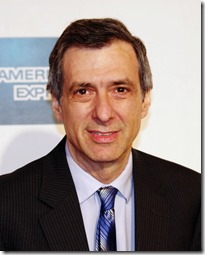"Reliable Sources" Host Discuses His Unreliable Work
Disclaimer: From 1999-2001, I served as one of three full-time producers for CNN’s Reliable Sources. I worked with host Howard Kurtz for two years. I left the show on good terms, but have spoken to Howie only once since leaving. During our time on the show together (and when producing a few of his pieces for Inside Politics), he always treated me respectfully. I enjoyed working with him.
When NBA player Jason Collins came out as gay in Sports Illustrated last week, Howard Kurtz, the host of CNN’s Reliable Sources, accused him of not being forthright about having been engaged to a woman. Worse, he mocked the player for “playing both sides of the court.”
In fact, Collins had explicitly disclosed his relationship with the woman in the article. When confronted with his error, Kurtz chose to modify the article only slightly. Only after continued criticism did the website The Daily Beast, the site on which his erroneous article appeared, retract the story. (Kurtz left The Daily Beast last week. He says it was amicable; other sources describe it as a “firing.”)
On Sunday, CNN invited two other media reporters to interview Kurtz about this mistake—and others—on his own show. From a crisis communications perspective, how did he do?
Generally speaking, Kurtz did a good job with his on-air mea culpa. He appeared humbled, chastened, and even shaken. He didn’t mince words about his errors, saying:
“The mistake I made was sloppy and inexcusable. I’m not going to offer any extenuating circumstances. I screwed up.”
“I deserve the criticism. I accept it. And I’m determined to learn from this episode.”
But there are at least two things I wish he had done differently.
First, he would have been much better served by acknowledging his original error immediately. As a result of delaying his apology, his eventual mea culpa may be perceived as a reactive necessity rather than a proactive choice.
Second, he didn’t fully answer multiple questions about his workload. During the time I worked with Howie, I wondered whether he was overburdened. At the time we worked together, he was not only writing a weekly column (and other regular articles) for The Washington Post and hosting Reliable Sources, but he was also writing a book called The Fortune Tellers. His workload has only seemingly increased in the digital age, with more columns, tweets, and online videos.
When asked whether he would decrease his workload, he said:
“I’m going to try to be careful not to take on too much.”
“I’ll leave it to others to judge whether I have taken on too much…my kids tell me I work too hard.”
“There are some people who say, ‘Well, maybe you had a little too much on your plate.’ I’ll leave that to others to judge….I’ll be careful from this point on not to take on too much.”
That strikes me as a rather tepid pledge, and Kurtz should have been more specific on this point. If his workload is going to be the exact same, how can he slow down and fact-check more carefully? If he’s going to take on less, what, specifically, does he intend to give up? An unspecific pledge that fails to enumerate specific action steps falls short of an ideal crisis communications approach.
For now, Kurtz is fighting to continue his role on Reliable Sources. As the pointed questions asked of him in the video above show, it won’t be easy.
Photo credit: David Shankbone
Have the best of the blog delivered to your inbox twice per month! Enter your name in the box on the upper right of the blog to join our mailing list.




Great perspective, Brad, especially given your personal experience with Howie.
I watched the show yesterday and appreciate your personal insights.
Sincerely,
Alvin
This is more a question than a comment. How much flexibility does Kurtz have in adjusting his workload? I know that my workload has doubled recently, and there’s not much I can do about it. I think many might feel the same. It might be different for someone in his role. I wonder if you can provide some insight.
Art,
That’s a reasonable question, and it’s one I don’t know the answer to. Based on the fact that Kurtz pledged to monitor his workload more carefully, I presume that means he has the luxury of cutting back on some projects if he chooses to do so. The important point is that if he’s working for too many venues simultaneously and committing errors as a result, he’ll diminish his brand across all of those platforms. And that will force him to take a pay cut, whether he wants to or not.
Thanks for writing!
Brad